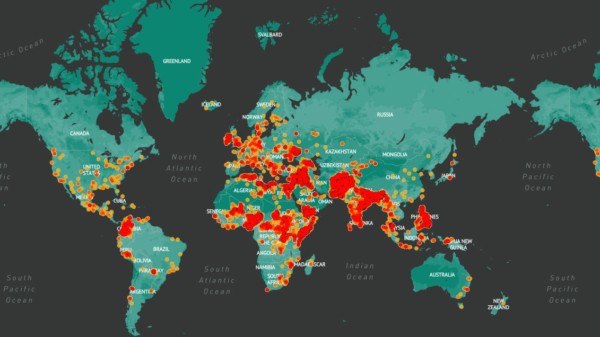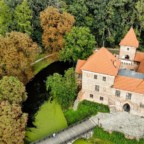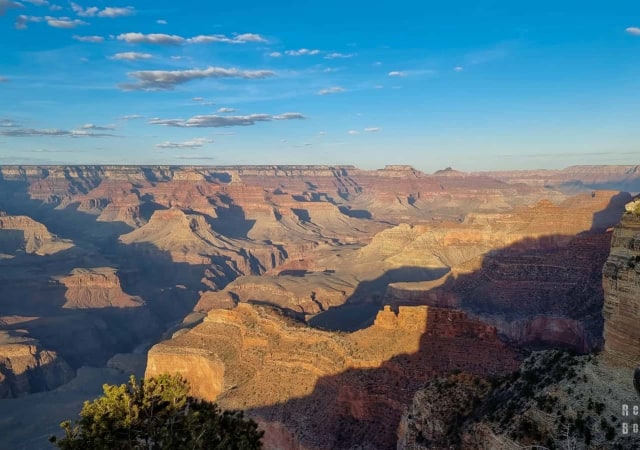Terrorist attacks have been, are and will be. Unfortunately. We don’t get our hopes up that there will suddenly be silence – no acts of violence by terrorists. But does that mean we should hole up in four walls? How about traveling only in Poland?
The truth is that even if by some miracle we manage to resolve one conflict, to suppress a terrorist organization, it will be replaced by several, if not a dozen new ones that will enter our lives with even greater ingenuity and determination. Unfortunately.
The topic itself is very sensitive, and we will leave the issue of counter-terrorism to the relevant services…. We, however, in this post want to focus on the aspect of safe travel these days.
Table of contents
Why are we even writing about it?
We learned about the recent attacks in Spain while away. We were in the Faroe Islands when we paddled back to the apartment, fired up the Internet and immediately a notification popped up that a car had driven into a crowd on La Rambla in Barcelona. We froze. We were there. Not once, not twice.
We were in the off-season, but even then the street was crowded with tourists. We immediately started looking for detailed information: who, how, how many victims. We looked with horror at the photos from the scene of the attack and did not expect that the next day news would reach us about another van driving into a crowd of God-guilty people.
Anyway, also during our previous trip, when we were in the Azores, there was an attack in London on London Bridge…, which we also knew very well and had been there many times. And how not to think about it here, when we travel quite a lot, we know the cities, we associate the places from the front pages of newspapers and Internet and TV broadcasts. There we could be, our friends, our family.
A safe Spain?
The attack in Barcelona moved us in one more respect. Until now, Spain has been considered one of the safer destinations for both holiday sojourns and weekend getaways (of course, we remember the bloody attacks in Madrid in 2004). Unlike Egypt or Turkey here, no one advised against traveling, and Barcelona itself, is always full of tourists.
Now after recent events, can we conclude that Spain is not a safe destination? Is it even safe anywhere in the world these days? Both in terms of terrorism, internal conflict, crime? Isn’t it better to travel in Poland? Or best not to travel anywhere? After all, it’s safest at home…. Are you sure?
Looking at the matter completely coolly, statistically, we are more likely to die in a car accident than in an act of terrorism (in 2016, 809,805 people died worldwide in traffic accidents [source] and 34,676 people died in terrorist attacks [ source]).
So can this fear be compared to an ordinary airplane flight, where an airplane crash is also less likely than a car accident (in 2016, 2,993 people died on Polish roads [source], 325 people died in airplane accidents worldwide [source])?
Of course, one can use the argument that by driving a car we are able to react to situations on the road, anticipate certain situations, think for other drivers, avoid dangerous situations. On an airplane and during a terrorist attack, not necessarily anymore. We, however, do not entirely agree with this argument…. About it later in this post.
There is another issue. Was it once safer? Wars, armed conflicts, extremists…. No, it used to be no safer. Now we simply face a different kind of threat, and on top of that we travel more than we did just a few dozen years ago. Nowadays, as soon as I hear of any attack I immediately wonder who of my family or friends might have been in the area and whether they are safe.
Add to that how quickly information (including unconfirmed information) circulates around the world. However, let’s keep in mind that mainly those from our “backyard” reach us anyway – attacks and conflicts in the Middle East, for example, are mentioned when something exceptional happens (read: a lot of people die), because it’s hard to look for any mention of many in Polish news portals.
How to travel safely?
As I mentioned above, statistically there is a greater chance of a car accident than being involved in a terrorist attack. More. So it does not mean for us that we should sit at home and not go anywhere. However, it’s worth being aware, traveling prudently and taking confident steps before traveling and, most importantly, before deciding where you intend to go. How to do it?
1) Foreign Ministry announcements on threats
At the moment, we completely do not consider (ba, we can’t even imagine!) traveling to countries to which the Foreign Ministry warns against travel on its website.
You can find current announcements here.
That’s why we don’t think at all about going to Egypt (where the Foreign Ministry’s warning says “do not travel,” and there is a “Travel Warning” for well-known resorts), Tunisia (“in the Foreign Ministry’s assessment, the threat of terrorist attacks persists throughout the country”) or Turkey (“a high threat of terrorist attacks persists throughout Turkey.”).
Spain is not on that list. Does that mean I’m safely there? In my opinion, there is definitely more danger in countries with Foreign Ministry warnings. These days, however, you have to be careful everywhere.
I remember one situation in London – I was conducting a training course when suddenly one of the participants received a text message that there were terrorist attacks in the British capital. If the situation happened in Poland probably the first thought would be that this is just a silly joke and someone wants to get away with training. However, in London, an alarm immediately goes off because you are aware that a bomb may have actually gone off right next door. However, the text message turned out to be false, nothing happened.
2) Register your trip
The Ministry of Foreign Affairs also operates the Odysseus service, where we can register our trip abroad. This will make it clear where we are in life-threatening situations. We always register there before longer or longer trips.
It has never been of use to us and may it never be of use to any of you. However, it’s worth blowing the whistle.
3) Travel insurance and EHIC card
Continuing the theme of blowing the whistle, we always tell you about it, to buy travel insurance. It is always a good idea to get such insurance wherever you go abroad. We write you about it every time we go.
Admittedly, we have never fortunately had the opportunity to use medical assistance, from theft our insurer got away with, for that we happened to use the insurance in case of delayed flights and delayed luggage. Besides, as always, it’s a good idea to blow the whistle. May it never be needed by anyone.
It is also a fact that most travel insurance has a provision in the exclusions to the terms and conditions that terrorist acts are not subject to health insurance. It is worth pointing out. We have not been able to find one that does not exclude this. Do you know such an insurer?
It is also worth remembering the EHIC card when traveling within the European Union. You will get the card on the spot at the branches of the National Health Fund, and with it you will receive basic assistance in the countries of the European Union without problems and free of charge.
4) Have eyes around your head
We should also always have eyes around our heads during our travels.
So it’s worth avoiding crowds whenever possible, paying attention to suspicious behavior, being vigilant. These are not extraordinary precautions, no different for me than watching out for pickpockets in crowded streets. However, we often feel too laid back on vacation and forget the basic aspects of our safety.
It is worth paying attention to every gesture, even the smallest, situation that seems suspicious to you. We once saw a bag left behind at an airport in the Canary Islands – we immediately called security to take care of the abandoned luggage.
Remember, if something seems suspicious or dangerous to you, it probably is, and the appropriate authorities must be notified immediately. Again, it is better to blow the whistle.
5) Let’s stay in touch!
Before leaving, it is a good idea to check the emergency numbers that operate locally. It is not always 112. It is also worth checking and writing down the address and phone number of the nearest Polish embassy or consulate.
It is also a matter of course to notify at least one person in Poland (at home) of our planned trip and of (at least) the planned travel route.
It’s also a good idea to get an ICE (In Case of Emergency) card. It is the size of a credit card, on which we write emergency numbers to loved ones should something happen to us, so that the services can more easily obtain information about us (medications, past illnesses, etc.). Carry the card with you at all times, preferably in your wallet in a prominent place.
An alternative to the paper ICE card are the ICE contacts on cell phones. It is simply enough that the most important numbers start with the phrase “! ICE…” (exclamation point to make the contact first in the list). On some smartphones, you can also add contacts to a special emergency group, so you can call these numbers even without unlocking the phone. May no one ever have to use it.
Where then to spend a safe vacation?
There is no clear answer to this question. There are countries or places where the risk of terrorist attacks is really low. I found interesting maps that show the countries where the attacks or their attempts took place. The first map is from the Washington Post and shows terrorist attacks in Europe through 2015.

The second map is interactive and covers the entire world.

As you can see, we live in one of the safer places in Europe ;)
However, if I had to give some advice I would say one thing: if you have doubts about whether it is safe in the place you want to go to, just don’t go there. Forget about it for a while, cross them off your list. Think about what is in the next and next place?
If you’ve always wanted to fly to Barcelona, but are very afraid to do so, is there any point in doing it right now? See how many other places there are to explore. I do not write: forget that you will ever visit this place. Absolutely not. I write: go there only when you are comfortable with your decision. What’s the point of going and spending the entire stay worrying about whether anything will happen? Are you sure this is a dream vacation? Will you be able to focus on the sights, monuments, museums? Maybe it’s worth letting go, going to another region?
We always put safety first. Twice we’ve let go of trips because we knew we wouldn’t have any fun, precisely because of the safety of the place. We will definitely get to them, we don’t know when, but someday for sure.
Have a safe trip!
Will we travel less after recent events?
Do we know where and how the terrorists will strike next time?
Do we know where the pickpocket will hunt us next time?
The answer to all these questions is no! Dangers lurk everywhere, whether at home, at work, at Auntie’s, in Poland or outside our country. It is important to travel prudently and not to panic in order to have fun.
So we wish you successful and safe travels! :)












